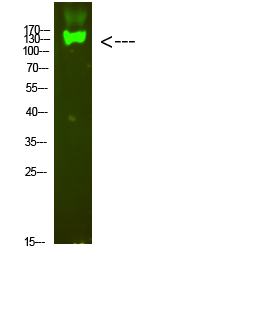Integrin β7 Polyclonal Antibody
- Catalog No.:YT6080
- Applications:WB;ELISA;IHC
- Reactivity:Human;Mouse
- Target:
- Integrin β7
- Fields:
- >>PI3K-Akt signaling pathway;>>Focal adhesion;>>ECM-receptor interaction;>>Cell adhesion molecules;>>Intestinal immune network for IgA production;>>Regulation of actin cytoskeleton;>>Human papillomavirus infection;>>Transcriptional misregulation in cancer;>>Hypertrophic cardiomyopathy;>>Arrhythmogenic right ventricular cardiomyopathy;>>Dilated cardiomyopathy
- Gene Name:
- ITGB7
- Protein Name:
- Integrin β7
- Human Gene Id:
- 3695
- Human Swiss Prot No:
- P26010
- Mouse Gene Id:
- 16421
- Mouse Swiss Prot No:
- P26011
- Immunogen:
- Synthesized peptide derived from human Integrin β7. at AA range: 671-720
- Specificity:
- Integrin β7 Polyclonal Antibody detects endogenous levels of Integrin β7
- Formulation:
- Liquid in PBS containing 50% glycerol, 0.5% BSA and 0.02% sodium azide.
- Source:
- Polyclonal, Rabbit,IgG
- Dilution:
- WB 1:500-2000;IHC 1:50-300; ELISA 2000-20000
- Purification:
- The antibody was affinity-purified from rabbit antiserum by affinity-chromatography using epitope-specific immunogen.
- Concentration:
- 1 mg/ml
- Storage Stability:
- -15°C to -25°C/1 year(Do not lower than -25°C)
- Other Name:
- Integrin beta-7 (Gut homing receptor beta subunit)
- Observed Band(KD):
- 130kD
- Background:
- This gene encodes a protein that is a member of the integrin superfamily. Members of this family are adhesion receptors that function in signaling from the extracellular matrix to the cell. Integrins are heterodimeric integral membrane proteins composed of an alpha chain and a beta chain. The encoded protein forms dimers with an alpha4 chain or an alphaE chain and plays a role in leukocyte adhesion. Dimerization with alpha4 forms a homing receptor for migration of lymphocytes to the intestinal mucosa and Peyer's patches. Dimerization with alphaE permits binding to the ligand epithelial cadherin, a calcium-dependent adhesion molecule. Alternate splicing results in multiple transcript variants. Additional alternatively spliced transcript variants of this gene have been described, but their full-length nature is not known. [provided by RefSeq, Sep 2013],
- Function:
- domain:Domain I contains three cation-binding sites: the ligand-integrin-binding site (LIMBS), the metal ion-dependent adhesion site (MIDAS), and the adjacent to MIDAS site (ADMIDAS). In the absence of a ligand or in calcium-dependent binding, only ADMIDAS is occupied. In magnesium-dependent binding all three sites bind metal ions. LIMBS positively modify ligand binding whereas ADMIDAS negatively modify ligand binding.,function:Integrin alpha-4/beta-7 (Peyer patches-specific homing receptor LPAM-1) is an adhesion molecule that mediates lymphocyte migration and homing to gut-associated lymphoid tissue (GALT). Integrin alpha-4/beta-7 interacts with the cell surface adhesion molecules MADCAM1 which is normally expressed by the vascular endothelium of the gastrointestinal tract. Interacts also with VCAM1 and fibronectin, an extracellular matrix component. It recognizes one or more domains wi
- Subcellular Location:
- Membrane; Single-pass type I membrane protein.
- Expression:
- Expressed in a variety of leukocyte lines.
- June 19-2018
- WESTERN IMMUNOBLOTTING PROTOCOL
- June 19-2018
- IMMUNOHISTOCHEMISTRY-PARAFFIN PROTOCOL
- June 19-2018
- IMMUNOFLUORESCENCE PROTOCOL
- September 08-2020
- FLOW-CYTOMEYRT-PROTOCOL
- May 20-2022
- Cell-Based ELISA│解您多样本WB检测之困扰
- July 13-2018
- CELL-BASED-ELISA-PROTOCOL-FOR-ACETYL-PROTEIN
- July 13-2018
- CELL-BASED-ELISA-PROTOCOL-FOR-PHOSPHO-PROTEIN
- July 13-2018
- Antibody-FAQs
- Products Images

- Western Blot analysis of mouse-heart cells using primary antibody diluted at 1:1000(4°C overnight). Secondary antibody:Goat Anti-rabbit IgG IRDye 800( diluted at 1:5000, 25°C, 1 hour)

- Immunohistochemical analysis of paraffin-embedded human Breast cancer. 1, Antibody was diluted at 1:200(4° overnight). 2, Tris-EDTA,pH9.0 was used for antigen retrieval. 3,Secondary antibody was diluted at 1:200(room temperature, 45min).



